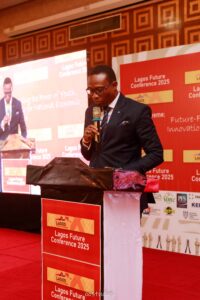
Building a sustainable digital future and resilient financial infrastructure for sustainable growth in Nigeria requires imbibing a new culture of the pursuit of knowledge, discipline, focus, and vision to create lasting value.
Dr. Yele Okeremi, the founder of Precise Financial Systems (PFS), gave the advice at the Lagos Future Conference 2025 held on Saturday, June 14, 2025, stressing that history doesn’t lie as nations that prioritise self-reliance, innovation, and long-term strategy don’t just grow rather dominate.
Represented by Mr. Babajide Alaka, director, Strategic Marketing & Communications, Precise Financial Systems, he said: “Technology isn’t just tools—it’s autonomy. As a software entrepreneur, I’ve seen firsthand how simple ideas can transform societies. But here’s the hard truth: Nigeria’s problem isn’t ideas; it’s implementation. We applaud vision but falter on logistics, policy, and scalability.
“It is a subsisting culture that has been pandered to by the Nigerian elite in their quest to ensure the golden goose always lives on their front yard. If we are serious about Nigeria’s digital future and building resilient financial infrastructure for sustainable growth, then we have to imbibe a new culture of the pursuit of knowledge, discipline, focus, and vision to create lasting value.
“Let’s now talk about building and not destroying. As much as we know that copying is not a sin, we cannot afford to copy the original to the bone. We have to ‘environmentalise’ whatever we need.
“There is no need of reengineering the wheel, it is round and gets the work done optimally but in copying the wheel, we must reflect on our particular challenges and the materials present around us to build the ‘Nigerian’ wheel. In effect if any country, from where we copied the original decides on an economic blockade, we will not have to revert to horses for transportation.
“It’s important to remind ourselves of this simple yet often overlooked truth. When we cite statistics like ‘45.4% of Nigerians have internet access,’ we must understand the reality beneath the numbers. In truth, nearly half of that digital access is concentrated in just three cities—Lagos, Abuja, and Port Harcourt. These urban centres enjoy comparatively better infrastructure, greater affordability, and higher levels of digital literacy”.
“But what about the rest of the country?
Nigeria’s vast rural and peri-urban regions are still largely digitally disconnected. Communities across states in the North-East, North-West, and even parts of the South struggle with unreliable electricity, expensive data, poor mobile network coverage, and limited digital education. These aren’t minor inconveniences—they are barriers that exclude millions from the digital economy”.
“If we are serious about multiplying digital entrepreneurship, innovation, and inclusion, we must ensure that access to enabling infrastructure—reliable internet, affordable devices, training programs, and power—is no longer a privilege tied to geography.
“Innovation cannot flourish in isolation. When only a few cities have the tools and networks to innovate, we rob ourselves of the talent, ideas, and ingenuity that lie dormant in the rest of the country.
‘Bridging this divide is not just a matter of fairness; it’s a strategic imperative. A truly digital Nigeria—one that is creative, resilient, and competitive—must be built on a foundation of equitable access. “That means deliberate investment in rural connectivity, community-based tech hubs, digital literacy programs in local languages, and inclusive policies that close the urban-rural gap.
“Only then can we unlock the full potential of our people and harness the power of technology to solve the challenges unique to every corner of Nigeria—not just the ones visible from Lagos.
While advocating for enhanced tech innovation, he stressed the need to identify critical stakeholders and “Stop admiring problems; start engineering solutions. The world’s most prosperous nations didn’t wait for perfect conditions—they created them. Will we?” I believe in Nigeria—its people, its promise, and its untapped power.
“The question is: can we unite all of this potential and turn the dream into a living, breathing reality? Nigeria must not remain an idea. It’s time to make it real”, he submitted.
Read Also: NACETEM Aligns with DigiVation Network on Lagos Future Conference



